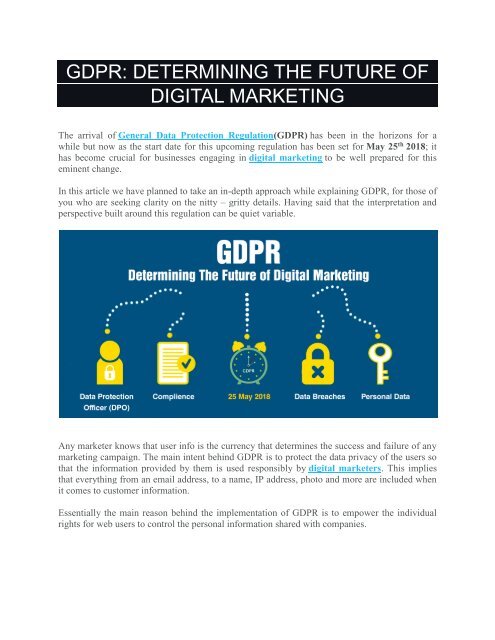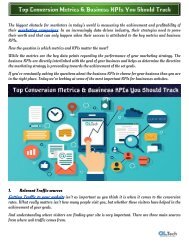GDPR - DETERMINING THE FUTURE OF DIGITAL MARKETING
Know about GDPR? What does it imply for business and how will it transform the future of digital marketing? Read more to find out!!
Know about GDPR? What does it imply for business and how will it transform the future of digital marketing? Read more to find out!!
Create successful ePaper yourself
Turn your PDF publications into a flip-book with our unique Google optimized e-Paper software.
<strong>GDPR</strong>: <strong>DETERMINING</strong> <strong>THE</strong> <strong>FUTURE</strong> <strong>OF</strong><br />
<strong>DIGITAL</strong> <strong>MARKETING</strong><br />
The arrival of General Data Protection Regulation(<strong>GDPR</strong>) has been in the horizons for a<br />
while but now as the start date for this upcoming regulation has been set for May 25 th 2018; it<br />
has become crucial for businesses engaging in digital marketing to be well prepared for this<br />
eminent change.<br />
In this article we have planned to take an in-depth approach while explaining <strong>GDPR</strong>, for those of<br />
you who are seeking clarity on the nitty – gritty details. Having said that the interpretation and<br />
perspective built around this regulation can be quiet variable.<br />
Any marketer knows that user info is the currency that determines the success and failure of any<br />
marketing campaign. The main intent behind <strong>GDPR</strong> is to protect the data privacy of the users so<br />
that the information provided by them is used responsibly by digital marketers. This implies<br />
that everything from an email address, to a name, IP address, photo and more are included when<br />
it comes to customer information.<br />
Essentially the main reason behind the implementation of <strong>GDPR</strong> is to empower the individual<br />
rights for web users to control the personal information shared with companies.
How Would <strong>GDPR</strong> affect digital marketing & Sale?<br />
1. Permission to opt in or opt out<br />
Under <strong>GDPR</strong>, permission has to be explicit. Companies have to have the ability to supply<br />
evidence that an individual has chosen to opt-in into communications and did not only fall onto<br />
the record by default such as assessing the unchecked ‘opt-in’ box on a form. ‘Double opt-in’ are<br />
also best practice; in which opt-in is followed up with a ‘click to validate’ email.<br />
But for corporate or company information, ‘implied consent’ means marketers can email<br />
somebody, provided that individual had the choice to opt-in for the mails at the time of purchase.<br />
Unless you are confident that your database doesn’t have any private data e.g. email, telephone<br />
number, our recommendation is that you stay as compliant as possible.<br />
2. The cookie Rule<br />
Cookies fall under the <strong>GDPR</strong> range, provided that they may identify people through device<br />
monitoring, mixing information along with different information or by treating folks as unique.<br />
Will cookies require permission? Yes, and so, clear opt-in. As an instance, if a visitor lands on<br />
your own website for the very first time, you need to keep cookies blocked or ignored before the<br />
person requires any permission activity. Much like email marketing, permission is subjectspecific<br />
or purpose-specific and, even if the website uses cookies for various purposes, it must<br />
find explicit approval for every one of these.<br />
Website managers need to ensure a smooth user experience when surfing and, at precisely the<br />
exact same time, supply top selection for permission in a manner that is friendly and also the<br />
least intrusive.<br />
3. Third Party Conformity<br />
For most marketers, third party tools and marketing technology providers (i.e.<br />
advertising automation platforms, CRMs etc) form a majority of their digital database. In cases<br />
like this, it’s significant that marketers check that their tech suppliers are prepared and ready for<br />
<strong>GDPR</strong> compliance, with steps in place to store and process, and incorporate information<br />
appropriately. Ahead of the May 2018 deadline, it is wise for entrepreneurs to:
• Ask providers to detail how they are going to store/process information to ensure <strong>GDPR</strong><br />
compliancy.<br />
• Ensure there is a point of contact from each side, plus a procedure in place to handle any<br />
information breaches. Both sides must Have the Ability to respond fast to manage, react and<br />
respond in accordance with ‘Data breach notification’ legislation.<br />
• Be sure to simply collect information that that’s necessary, or falls under a ‘legitimate<br />
interest’.<br />
• Make sure it is possible to delete information if the user stops the service, also they should be<br />
able to download their own data when asked.<br />
4. <strong>GDPR</strong> Scale<br />
Now that we have made it clear how crucial user data security will become once <strong>GDPR</strong> is fully<br />
applied, now let’s move on to how much of the user information be allowed to be used by<br />
businesses.<br />
As most of you are aware that platforms like Google or Facebook.com have certain<br />
functionalities asking users to provide their personal info for a variety of reasons, now the<br />
question is where does <strong>GDPR</strong> come into all this?<br />
Well the answer is clear, <strong>GDPR</strong> will create levels on the basis of which the type of information<br />
that is being be collected will be determined. And platforms need clearly communicate to the<br />
user on the details of how their provided info will be used by the businesses.<br />
Let’s call it the <strong>GDPR</strong> scale shall we, this scale applies principle of “purpose limitation”, under<br />
which personal data must only be “collected for specified, explicit and legitimate purposes and<br />
not further processed in a manner that is incompatible with those purposes”
5. Rise of the Inbound Techniques<br />
With all the upcoming restrictions regarding customer privacy and data protection, the<br />
increase in the application of inbound techniques by the marketers is bound to happen. As<br />
Inbound marketing implicitly dictates that the consumer should come to the business, rather than<br />
the other way around. The inbound marketing also know as content marketing aiming to provide<br />
the users a more personalized experience, hence resulting in improvement in customer service.<br />
Gated content, organic and paid social media, website registration pop-ups, webinars, event<br />
subscriptions, etc. can generate leads, enrich our clients’ adventures or drive sales or conversion.<br />
What we must do today is make our audiences aware of exactly what we will do with the data we<br />
gather and where we store/use it.<br />
Disclosure:<br />
Although the above mentioned points are the product of the extensive research done by us,<br />
however as we have mentioned above as well the interpretation of the regulation can vary from<br />
business to business. It is strongly advisable for businesses to consult an advocate beforehand in<br />
order to ensure 100 % compliance.<br />
Few final words!<br />
Now it may appear from the above mentioned points the arrival of <strong>GDPR</strong> might paint a bleak<br />
picture for the future of digital marketing, however if business to adhering inbound principals<br />
the quality of customer service will amplified through leaps & bounds without having to worry<br />
about <strong>GDPR</strong> restrictions.<br />
Now hate to state the obvious but better customer service means happy customer which results<br />
into customer loyalty and so on and so forth, we’re sure you get the gist.<br />
Well that’s our uptake on this, will keep you posted!!

















